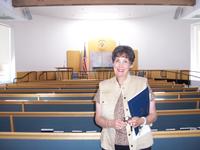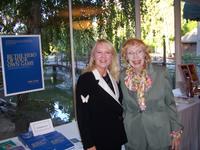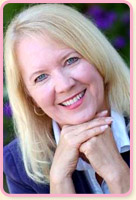Making A Pointe

Loretta Modelevsky
MAKING A POINTE
Terri Marie
© 2005
Upon entering Heritage Pointe, there is a tribute to Loretta Modelevsky, which says, For having a dream and turning that dream into reality
You may recognize the name “Modelevsky.” A few months ago I did an article on Herb called “Herbie’s A Clown.” As I begin the first “real” column on “Heroes, ” I thought Herb’s wife, Loretta would be a great choice.
Not only are they a couple dedicated to giving their best to the community, they help and support one another. Sounds heroic to me.
“What were we going to do to leave a better world?” was the question on Loretta’s mind, when Loretta and her friend. Meryl Schrimmer, first came up with their big dream. It was to fill a need, an empty hole in the retirement home sector.
There was no home for the aged to serve the growing Jewish population.
Both ladies had parents who had strokes. They already had a wonderful friendship. “We can finish each other’s sentences. The areas I’m weak in,
she’s strong and vice versa, said Loretta.” Those traits proved valuable
for the workload ahead.
The Dream
“Our first vision was, if you’re going to dream, dream big.”
Loretta and Meryls’s original dream was to have a campus with a nursery school attached so that the young could interact with elders. “That dream's still our dream.”
But they didn’t wait. They went to work, established chapters, raised money,
created a nonprofit corporation, undertook a feasibility study and looked for
the location. “I didn’t think it would ever happen but this building came up,” Loretta said. Then the miracles started.
The Dream is Realized
“Everything that happened was a sign to go ahead,” said Loretta. They learned
that the Avon Company was going out of the retirement housing business and had a building in Mission Viejo. “It was a brand new building, already furnished.
It was like a dream come true, on 5 ½ acres, very close to the freeway, medical facilities, shopping, entertainment, all the things that we would need.”
They got the building.
Choosing the Baby’s Name.
They wanted the home’s name to be descriptive, easy to spell and understand.
“It’s part of our heritage to help the elderly and that was our ‘point.’
Thus the name Heritage Pointe. It took nine months to come up with that name, as long as it takes to have a child,” she said. They opened their doors to seven residents. “It was like a little family,” Loretta said.
More residents followed very quickly.
Getting an enormous project like this off the ground took immense resources of
time and money. Loretta is very proud that all the money was raised by the people within the Jewish community. No outside funds were solicited.
Loretta and Meryl divided up the huge geographic community of Orange County, went from home to home, had coffees and talked about their dream. “We showed a video of a retirement home and said this is what we’d like to do in the future, never dreaming that in our lifetime it would happen. We were so lucky. The building was a God-given gift,” she said.
Their charter sponsors initiated the seed money. “You don’t just wake up one
morning and say, ‘Wow. I think we’re going to have this home and it’s going to be needed.’ You have to do a study like all businesses do and see if there’s a need.” The day before escrow closed they asked eight very generous people to guarantee a loan, and the doors to her dream opened. Loretta became a Co-Founder of Heritage Pointe with Meryl.
Loretta takes her responsibilities very seriously, “We have a fiduciary responsibility to the community,” she says. They now have seven support chapters from Fullerton to San Clemente and chapter’s events are going on all the time.
She is especially proud of their scholarship program, funded to the tune of
$800,000 a year. This helps a certain percentage of residents who could not otherwise afford to live there. “We make sure that the little lady who might have been in a motel someplace has a wonderful place to be now,” she says. “Nobody is identified as a scholarship resident because we want to keep their dignity intact.”
Another program is the Intergeneration Program. Teenage kids ready for their bar mitzvahs or bat mitzvahs come in at the age of 12. “Mitzvah” means good deed.
“Many of them have selected the home to be with ‘grandmas and grandpas.’
Some of these kids don’t have any grandparents.” Loretta says.
The volunteer sector is the lifeblood of Heritage Pointe. “It is absolutely
amazing what they do for us. At any given time we have 75-100 volunteers.”
They come one way only, by word of mouth. “I never advertise for volunteers,”
she says and feels it is very important to have people do what they get
satisfaction from.
Loretta personally interviews each volunteer and asks a few key questions.
"What do you do for fun? What did you do in your work?”
The volunteers range in age from as young as 7 to 90. “We had one little
7 year- old come in and want to dance. She put on her tap shoes and went
out on the patio and danced for them Oh, they love the kids!”
“I encourage people to volunteer because every one of my volunteers has said
they’ve gotten more out of it than they have given. If you want to meet amazing people in this world, volunteer. “Without volunteers I think this world would
be a totally different place,” Loretta says.
Loretta speaks fondly of the couples who come in together and help each other.
“What a beautiful thing to see people that have been married 60 years still
walking hand in hand!” She has a deep respect for the residents and feels they
are tremendous survivors. “Many came to this country not speaking English. They didn’t have things printed out for them in their language. They learned the language. They made sure that their kids were well educated.
Some lived through the holocaust,” she said. “Many residents are in their high 90’s. We have one lady who’s 100. These are not bed-ridden people, maybe a little weakened, but our residents are mentally alert and still want to learn. We’re home now to just under 200 residents.”
Loretta matched a 100-year-old woman who was a nurse for 40 years with a little who wanted to become a doctor, through their “Adopt a Grand Friend program.” “We don’t call them grandparents. We call them grandfriends. The friendship continued for 10 years. It was so beautiful that somebody her age could relate to a child much younger than she was.
Friendships have formed that never, ever would have happened if not for their involvement in building something together. The community makes the place more alive.”
A 12-year-old boy told Loretta that he wanted to make a cookbook. She gathered together some of the ladies that like to cook and matched one lady with this little boy. They cooked meatballs, brownies, and cookies together once a week on Sundays. The boy is now in high school and has become part of her family. He has written about how volunteering with her has touched his life.
The residents love the business center with 8 computers and volunteers to teach them. “Sometimes it takes them a little longer to learn but I don’t think the
center is ever empty. The computer opens up a whole world to people. They’re not alone in their last years.” Loretta says.
One of the residents returned to the home after being hospitalized and said, “It’s so wonderful to be home again.” Loretta is pleased that they think of Heritage Pointe as their home.
When it first opened, Heritage Pointe had no synagogue. Today you walk into a beautiful synagogue. “It’s like a big hotel with a staff of 100. It’s a little
city. We wanted to serve the very active, the assisted and those who need more
care. We have found that the bulk of the people need that middle area, assistance.”
Heritage Pointe has become Loretta’s extended family. She spends a minimum of two full days a week there, often more. The other days she is networking and attending other meetings that her history with the home might help with. “I’m always reading to find an interesting article that I think can enhance the home. It’s been a wonderful learning experience.”
Loretta and Herb understand the needs of each other because they both volunteer. They are each proud of what the other is doing in life. When she started the home Loretta had to be away a lot. Herb gave her the encouragement she needed. “I think that’s what every married couple has to do when they are doing things to serve outside their own home. Herb has given me the time to grow and do this job that has escalated beyond my wildest dreams.
I think we both are healers. Herb’s healing is done in his way and mine is done in my way. The way Herb heals is by teaching. Laughter is a healing thing. How I heal is to enrich programs and bring meaning into the lives of people who maybe are not as sure of themselves as they used to be. And to make them feel that whatever they have is worth sharing.
The fastest growing segment of our population is the people over 65 now. The
elderly should be learning and involved the same way as young people are.
People who never knew they could paint, when they take a painting class, find
that all of a sudden they are talented in art, ” she smiles.
If you read the article on Herb, you’ll remember that it was Loretta who gave
Herb the clown party and the certificate for clown school that spurred his dream of cheering up children who were ill. Loretta says of that famous party. “Herb’s always loved clowns. Being a clown makes you a different person, able to do things out of your own character. I saw the retirement years were coming up and I felt he’d have more time.”
Herb had three special patients, a set of premature triplets. Their parents were clowns with a last name of Graham. They named their triplets, Candy, Millie and Holly Graham. “It was so cute,” Loretta says. “They were in little drawers because they were so tiny. Herb didn’t want them to come to the office because he was afraid they’d pick something up and get sick, so every week he took his nurse, the scale and went to their home.
He got to know these clowns every well.” Loretta did research on where Herb could study to be a clown. When the idea for the party came up she thought, “Should I bother people to dress up as clowns, but I took the chance.” Good thing. She’s taken many chances.
While Herb’s character changed from doctor to clown, Loretta stays in one character, focused with a strong business sense. “If I’m going to do something I set a plan and don’t rest until it’s done. Herb was like that in medicine. He was a marvelous physician.
My mother always said, ‘If one and one don’t add up to two, it’s not right.’”
Herb and Loretta definitely add up to something special. While Herb cheers up the lives of those who recently made it into this world, Loretta works to add elegance to those who are the later part of their earthly journey.
What you see beyond the walkers and the gray hair when you enter Heritage Pointe is the smiles. Smiles coming at you, smiles going past. “I think loneliness is the ultimate poverty,” Loretta says. “I never dreamed it would be such a wonderful place for people to grow and enjoy,” she says.
Busy with the “baby” she’s been raising for 15 years, Loretta reached her goal of creating a wonderful “Heritage” and her “Pointe” has been well received. Loretta serves to give elders within the Jewish community a better place to live, opportunities for enriched and meaningful lives full of dignity and respect.
Loretta has a saying, “Those who step in front of you and do not want to go along with what you’re doing and are negative, tell them to get out of the way while you do it.”
Loretta’s Pointe’s For Following Your Dream
• It’s up to us to make the world a better place not just with a big project but with every project.
“It is our custom in Judaism to help the elderly.
That’s one of the most important things that we do,” she says.
• Decide what your goal is and don’t wait for everything to be perfect.
If Loretta and Meryl waited until they created the campus they envisioned,
they would not have been able to serve so many people in the meantime. “In a
perfect world, this is what we wanted to do, but you know the world isn’t exactly
perfect. Our job is to try to perfect it a little piece at a time. Not the whole
thing, just a piece at a time. This is our piece now.”
• Decide if you can handle the negatives that could come up. If you can, go ahead with your project.
• Surround yourself with people smarter than you are.
When Loretta and Meryl saw that they needed help, they called in a consultant.
“We didn’t try to make decisions that we didn’t know how to make,” says Loretta.
• Learn from them all.
“An elder has so much to give. We can learn so much from them. They’re, so
loving and caring. They are all like grandmas and grandpas to me.”
• Don’t expect to do it in a day,
“Chip away and do a little bit at a time. It took about 3 years before we had
our Board of Directors and raised part of the money.”
• There’s a lot of ways to help.
"People can write a check, help physically, help with their ideas.
You need all of those. For instance a retired optometrist adjusts their
eyeglasses because there’s a lot of low vision problems in the residents.”
• Never forget the basic thing...to thank people and make them feel that what they do counts.
“People don’t wake up in the morning and say,
'Gee. I don’t want to be thanked today.”
One of Loretta’s, favorite inspirational quotes sums up why she loves her work at Heritage Pointe.
Definition of an Elder
Author unknown
An Elder is a person who is still growing, still a learner, still with potential and whose life continues to have within it promise for, and connection to the future.
An Elder is still in pursuit of happiness, joy, and pleasure, and her or his birthright to these remains intact.
Moreover, an Elder is a person who deserves respect and honor and whose work it is to synthesize wisdom from long life experience and formulate this into a legacy for future generations.
And that’s a heritage with a beautiful point.
Terri Marie
“A hero is someone who helps someone in time of need.”
For past articles on "Heroes Among Us," to share your hero stories,
or to recommend a hero for a future article
Please visit heroesamongus.blogspot.com







